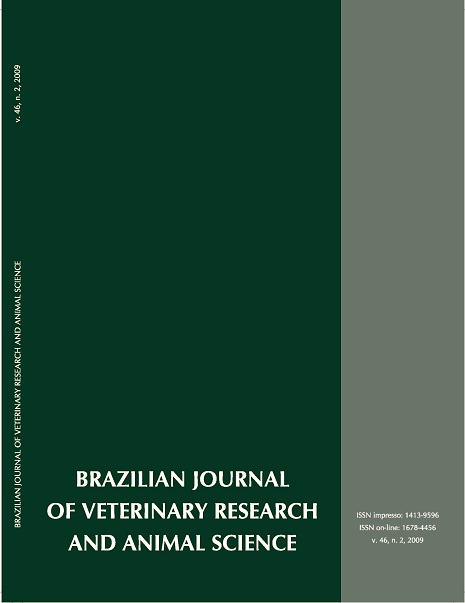Reproductive alterations in male rats exposed perinatally to Solanum lycocarpum fruits
DOI:
https://doi.org/10.11606/issn.1678-4456.bjvras.2009.26762Keywords:
Solanum lycocarpum, Solasodine, Reproductive function, Fertility, Sperm production, RatAbstract
This work employed pregnant rats treated with Solanum lycocarpum unripe fruits (10% in diet) from gestation day (GD) 06 to post-natal day (PND) 07, for the evaluation of the sperm number, daily sperm production and epididymal sperm transit time of the male offspring at PND 60 and PND 90. No differences were observed in the daily sperm production (DSP) and sperm number in the testis of the exposed males at PND 60 and PND 90. Also, no alterations were observed in sperm transit time in the caput epididymis of the exposed males at PND 60 and PND 90. However, a reduced sperm transit time was observed in the corpus/cauda epididymis of the experimental males at PND 90. The last data may explain the reduced sperm number observed in the corpus/cauda epididymis of the experimental male rats at PND 90. These data show that the male rats exposed to S. lycocarpum fruits during gestation did not present alterations in testis sperm production and number, however the sperm transit time through epididymis was impaired, resulting in a decreased number of spermatozoa in epididymis cauda. We conclude that S. lycocarpum may cause imbalance on hypothalamus-pituitary gland axisDownloads
Download data is not yet available.
Downloads
Published
2009-04-01
Issue
Section
UNDEFINIED
License
The journal content is authorized under the Creative Commons BY-NC-SA license (summary of the license: https://
How to Cite
1.
Schwarz A, Kempinas WDG, Soares MR, Bernardi MM, Spinosa H de S. Reproductive alterations in male rats exposed perinatally to Solanum lycocarpum fruits. Braz. J. Vet. Res. Anim. Sci. [Internet]. 2009 Apr. 1 [cited 2026 Jan. 18];46(2):152-7. Available from: https://revistas.usp.br/bjvras/article/view/26762





